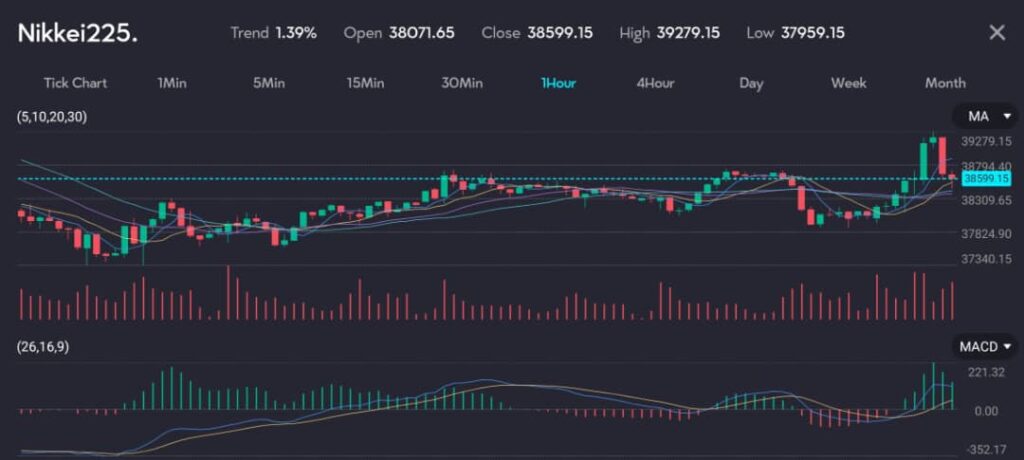Key points:
- The Nikkei index increased by 0.25%, supported by banking stocks after the BOJ rate hike.
- Banks attracted substantial foreign investments, with net stock purchases reaching 472 billion yen.
Japan’s Nikkei share average rose on Wednesday, buoyed by banking stocks after the Bank of Japan (BOJ) raised interest rates for the second time since 2007. The Nikkei index was up 0.25% at 38,620.85 as of 0421 GMT, reversing earlier losses. The broader Topix index also turned positive, trading 0.37% higher.

See: Nikkei225 on the rise as seen on the VT Markets app.
BOJ hikes key rate to 0.25%, signaling shift towards policy tightening
The BOJ raised its key rate target to 0.25% from around zero, reflecting heightened expectations for policy tightening. This move followed reports suggesting that the BOJ was considering such a step, and several high-profile Japanese politicians, including the prime minister, had also advocated for a near-term normalisation of monetary policy.
The Tokyo Stock Exchange’s banking index surged 2.7%, making it the top performer among the 33 industry groupings. Higher interest rates are expected to improve lending margins and potentially boost investment income for banks. A Topix index of value shares rallied 0.8%, while a growth share index dipped 0.2%.
Exporter stocks weaken as yen strengthens
Stocks of exporters, including automakers, showed weakness after the yen strengthened by about 0.8% against the dollar on Tuesday. Toyota Motor was among the worst performers on the Nikkei, also affected by a corrective order from Japan’s transport ministry over violations in vehicle certification procedures. The stock dropped as much as 4.2% and was last down 2.4%.
Banks lured an estimated 472 billion yen ($3.1 billion) of net stock purchases in the year to July 25, more than double the flows into the automobiles and components sector, another top performer.
BOJ rate hike signals tighter policy, impacting banks and exporters
The BOJ’s recent rate increase, following its first hike in March since 2007, underscores a shift towards tighter monetary policy. This change has significant implications for various sectors, particularly banks and exporters.
As the yen strengthens and interest rates rise, banks stand to gain from improved lending margins, while exporters may face headwinds due to currency fluctuations.
Also read: Dollar and yen remain steady as markets await BOJ and Fed decisions
The BOJ’s decision to raise rates has provided a boost to the banking sector, driving the Nikkei higher. However, the impact on exporters and automakers highlights the diverse effects of monetary policy changes across different sectors.
Start trading now — click here to create your live VT Markets account.







